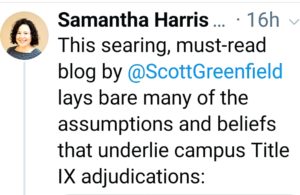TITLE IX RULINGS: Can The “Single Investigator” Model Ever Be Fundamentally Fair?
 At oral argument in Doe v. University of Sciences before the Third Circuit, an issue that gets only tangential consideration was front and center: Can the schools using the “single investigator” model for Title IX sexual determinations suffice as a fundamentally fair method? KC Johnson provides the background to the case… In the Sciences case, two sorority sisters filed Title IX claims alleging that the accused student had sexually assaulted them (in different incidents, both of which occurred many months before the reports). The first accuser appears to have persuaded the second accuser to file. Although the University of the Sciences promises fairness in its investigations, it employs a single-investigator model; the same person handled both allegations. After interviewing the parties, she returned a guilty finding; Doe appealed but was expelled halfway through his senior year.
At oral argument in Doe v. University of Sciences before the Third Circuit, an issue that gets only tangential consideration was front and center: Can the schools using the “single investigator” model for Title IX sexual determinations suffice as a fundamentally fair method? KC Johnson provides the background to the case… In the Sciences case, two sorority sisters filed Title IX claims alleging that the accused student had sexually assaulted them (in different incidents, both of which occurred many months before the reports). The first accuser appears to have persuaded the second accuser to file. Although the University of the Sciences promises fairness in its investigations, it employs a single-investigator model; the same person handled both allegations. After interviewing the parties, she returned a guilty finding; Doe appealed but was expelled halfway through his senior year.
From the outset, the deck is stacked. It doesn’t have to be, but consider the qualifications of people who seek the job of Title IX investigator. They tend to be people deeply involved with and sensitive to sexual misconduct against women on campus, usually with long histories of activism and proven dedication to the elimination of sexual misconduct against women. Their perception of the problem that guides their investigation is grounded in an ideological belief that precludes any fair assessment of the facts. They are dedicated to finding the facts, aggregating and presenting them in such a way as to assure the only “correct” outcome: guilt. These Title IX investigators interview the accuser and accused, together with those witnesses they deem relevant. They gather evidence they deem relevant. They pursue avenues they deem relevant. If they deem only that which proves guilt to be relevant, then they ignore witnesses and evidence that don’t. It’s left entirely in their hands. When the only evidence presented is evidence of guilt, the outcome isn’t a mystery. When the entirety of a process is placed in the hands of one person, who then presents conclusions based only on the evidence that supports the conclusion and omits all the evidence that shows it to be baseless or biased, it easily creates the appearance of fairness without any of the substance. Add to this the sort of person hired to play the role of Title IX investigator and the problem is abundantly clear.
While most arguments about the single investigator model tend to revolve around the mandates of due process and fundamental fairness, whether under the Constitution, or express or implied contractual terms, few cases directly confront the inherent impropriety of making one individual “judge, jury and executioner.” There should be no question that the inquisitorial model, no matter how one characterizes the virtues of the inquisitor, invariably fails to provide the accused with a fair process.
simplejustice.us-Greenfield

